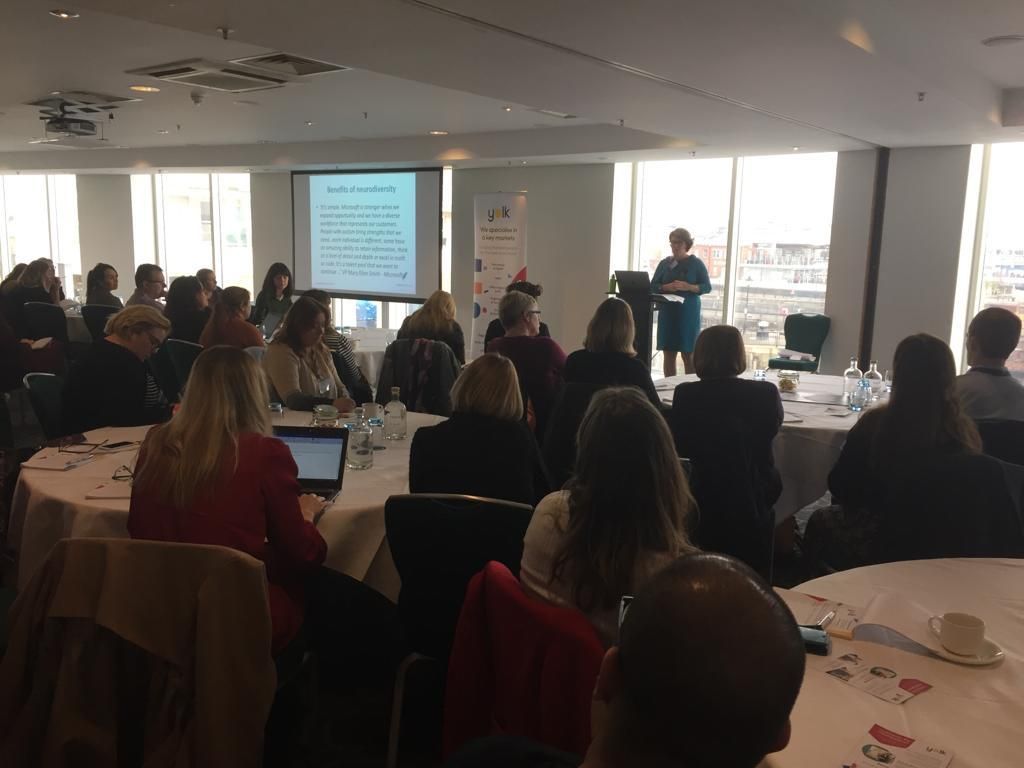
...
Our last HR sessions of 2019 took place on Tuesday the 19th of November, this time at the lovely Voco St David’s Hotel down Cardiff Bay. After braving the brisk winter weather and the traffic, we kicked off the talks with Anna Denton-Jones from Refreshing Law introducing our topic for the day: neurodiversity in the workplace.
Anna’s presentation answered a series of key questions on what neurodiversity means to us as individuals and as a society, and inevitably, the impact such perceptions have on organisations’ ability to provide reasonable adjustments to neurodivergent employees. She also shared insightful data on what case law says about neurodiversity in the workplace.
So what is neurodiversity?
As defined by the ACAS (the Advisory, Conciliation and Arbitration Services), neurodiversity “refers to the different ways the brain can work and interpret information. It highlights that people naturally think about things differently. We have different interests and motivations and are naturally better at some things and worse at others.”
One main point that came across that morning is that there is no “standard brain”. In fact, neurodiversity is beneficial to our society and hence, a neurodiverse workforce can strive better as a wider variety of skills and intelligences coexist and work together. However, this would require companies to be neurodivergent friendly - but to what extent are we?
Are we neurodiverse?
A surprising statistic from ACAS is that 1 in 7 people are neurodivergent, which makes up to 15% of the population. From this standpoint, neurodivergence suddenly becomes less of a rarity as most workplaces are probably more neurodiverse than perceived.
You’ve probably heard many cliches about neurodivergent individuals. To avoid falling into stereotypes, there needs to be an open dialogue in order to overcome the existing stigmas and cliches about neuro-minorities, starting with training managers using appropriate terms to refer to neurodiversity.
What does neurodiversity mean for employers?
Neurodiversity is to organisations what biodiversity is to nature. Neurodivergent individuals possess invaluable skills and abilities beyond the difficulties derived from their conditions. For instance, people with autism often have amazing abilities to retain information or are incredibly detail-oriented. Moreover, a neurodiverse workforce is more representative of the reality of society, and if reasonable adjustments are made it can increase productivity and reduce staff turnover.
What does case law tell us about neurodiversity?
Legally, when any element of the premises places a disabled person at a substantial disadvantage the employer is required to make reasonable adjustments to remove it. The employer is expected (to a reasonable extent) to know about the disability and act on it before the duty kicks in. Therefore if an employer is aware of a disability they are expected to understand the consequences of the condition before taking any unfavourable action which would ultimately discriminate against the employee.
On the other hand, many people can go on for years without being professionally diagnosed. Employers might notice a pattern of issues but struggle to clearly define the underlying cause or the support needed by the employee. It is most advisable in those cases to seek expert advice whilst respecting all confidentiality until a plan is developed that encourages an open dialogue regarding what adjustments have to be made, as well as setting regular reviews. Appropriate training is also an effective way of making a workplace more neurodivergent-friendly.
You can find Anna’s slides, which offer case law examples, case studies and sources of further information here. Her contact details are at the bottom of this article.
Following a short break, Sandra Cutler from Dyslecsia Cymru/Wales Dyslexia introduced the charity and emphasized on the importance of understanding what dyslexia really is beyond its symptoms- something applicable to most conditions.
Wales Dyslexia aims at helping creating an environment where the individual with dyslexia can develop to their full potential. In order to do this, they offer screenings in English (6-adult) and Welsh (7-11), assessments* (7 – Adult), workplace assessments*, inset training for schools, as well as seminars and workshops. They also provide a free bilingual helpline (contact details below).
What is dyslexia?
Dyslexia is essentially a difference of wiring within the brain that affects about 15% of the UK population. It is known to affect literacy and they way in which information is processed, usually being the cause of difficulties in language development, motor coordination, concentration, focus and organisation. However, by themselves these are not markers of dyslexia. Dyslexia occurs across all ages and all levels of intelligence.
Just like other conditions, dyslexia ranges across a spectrum with no “degrees” or “categories” and no clear cut-off points. Therefore, they are all individuals with unique traits, strengths and weaknesses and are affected by dyslexia differently.
As Sandra emphasized, dyslexia is a recognised difficulty under the Equality Act of 2010. Therefore, employers should ensure that reasonable adjustments and/or support are available.
Similarly as with other conditions, employers face the issue that not all individuals with dyslexia will disclose it, or even be aware of it. If considered necessary, employers should raise the matter in an appropriate way in order to provide the employee with reasonable adjustments for their potential problems with:
Short term memory: Understanding that it’s essential for access and storage in long term and working memory.
Time: Allowing approximately 25% extra time for reading texts.
Organisation and auditory processing: Electronic diaries and recording devices are helpful.
Noise levels: Maintain low or allow earphones.
Light (vision stress): It’s important to advise the person to take an eye test from where further testing can be suggested.
All these issues can lead to low self esteem and confidence in dyslexic (and other neurodivergent) employees, which can cause stress hence decreasing their wellness in the workplace as well as their productivity.
We’d also like to share some information about the Reasonable Adjustments Disability Passport, a document created by the Trades Union Congress (TUC). They’ve adopted a social model of disability that focuses on the social and institutional barriers that restrict disabled people’s opportunities and look into the concrete ones that affect different individuals.
According to the TUC, the document is essentially “(...) a live record of adjustments agreed between a worker and their manager to support them at work because of a health condition, impairment or disability. The passport supports members and their reps to work with employers to ensure that up-to-date, appropriate, practical and correct reasonable adjustments are in place.”
The document protects disabled members’ right to preserve their reasonable adjustments, especially when moving roles or undergoing line manager changes. You can find the TUC’s full informative PDF on the Reasonable Adjustments Disability Passport here.
The main conclusion to draw out of this session is that workplaces have the potential of being incredible support systems, but for this it’s necessary for managers and other team members to broach these issues with respect and open-mindedness, possibly referring to HR for diagnostics and assessments. Comprehending how the brains of neurodivergent individuals function can lead to a greater understanding of how they can unlock their best potential at work and provide a unique set of skills.
*Please note that 1) it is essential that all assessments are carried out by fully qualified assessors who have current certificates of Practice, holding an Assessment Practising Certificate (APC qualification). Failure of this requirement may lead to the assessment being declare null-and-void /unacceptable and 2) Today only one assessment is required from 7 years of age until early twenties.
Contact details for Dyslexia Cymru/Wales Dyslexia
Free bilingual freephone: 0808 1800 110
Contact details for Refreshing Law Ltd:
Landline: 02920 599 993
Mobile: 07977 545 480

